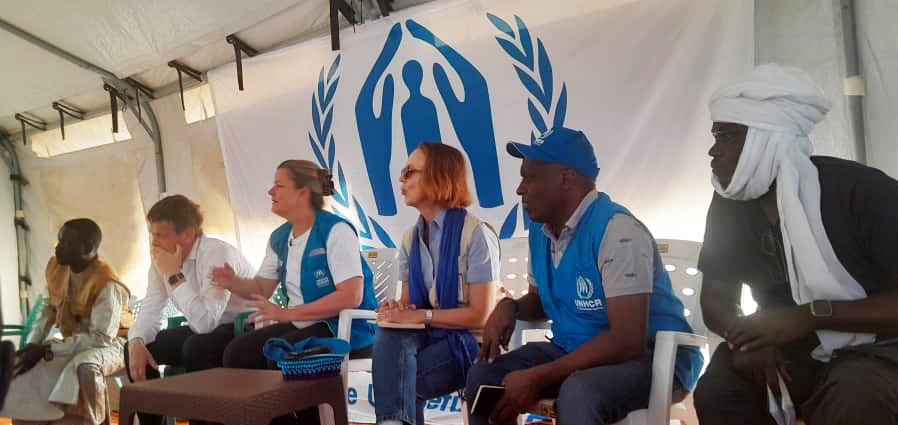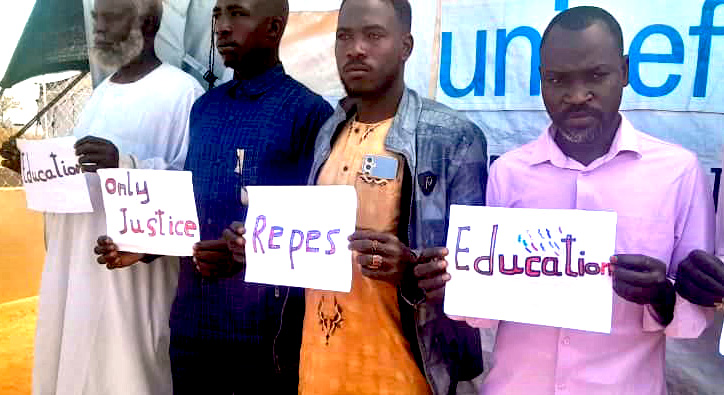UNHCR visits Sudanese refugees in Chad

The UNHCR delegation visiting the Farchana camp in eastern Chad, led by Deputy High Commissioner Kelly T. Clements, third from the left (Photo: RD)
A delegation from the UN refugee agency (UNHCR), led by Deputy High Commissioner Kelly T. Clements, visited the Farchana camp in eastern Chad yesterday, where Sudanese refugees are seeking sanctuary amidst ongoing conflict.
During the visit, residents of the Farchana camp passionately appealed to the international community for intervention to halt the conflict and ensure justice for its perpetrators. They also called for provisions of resettlement, education, and healthcare services.
Accompanying Clements’ delegation were the UNHCR representative from the Regional Office for West Africa in Dakar, Senegal, a Chadian UNHCR representative, and members from several organisations operating within the camp.
The camp’s residents issued a memorandum to the visiting delegations, demanding accountability for the actions of the paramilitary Rapid Support Forces and their allied militias. Notably, refugees visibly displayed their demands on placards during the delegation’s visit.
The delegation’s itinerary included visits to the recently established El Tadamon Primary School and UNICEF headquarters, where they provided essential aid for the camp’s children.
Additionally, they engaged in discussions with camp officials to address the challenges confronting the refugees. Special attention was given to the concerns of women, with a dedicated meeting held to address their specific needs.

According to the UNHCR, women and children represent at least 90 per cent of the refugees, with some 77 per cent of women arriving alone in Chad, with children.
Reports indicate that many have fallen victim to gender-based violence and now require comprehensive follow-up support. The UNHCR states they provide medical and some psychological support, but more is needed.
Chad has emerged as Africa’s top per capita host for refugees, accommodating over 1.1 million individuals, among them more than 553,150 new arrivals from Sudan as of mid-February. These refugees face significant obstacles in accessing necessities such as food, water, healthcare, and security amidst the turmoil of conflict.
“Chadian officials are concerned that many more hungry Sudanese families will come in the next weeks,” said Kelly T. Clements in a press statement for the UNHCR.
“The country is committed to keeping its borders open, despite the fragility of this region. But doing so will put even more strain on Chad, which has so graciously been hosting refugees from Sudan’s war – now raging almost a year – and other refugees still here from earlier emergencies.”
“Even without more [Sudanese refugees] coming, needs now run well beyond the capacities of humanitarian agencies. There are very real fears that the border region faces another paltry lean season before heavy rains lash the camps.
“Resources are scarce and humanitarian funding is extremely tight. We need development actors to step up, rapidly. A dire situation could become much worse very soon without concerted efforts to deliver more to Chad.”
Chadian authorities and the UNHCR are facilitating the transfer of refugees from the Adré reception centre, the majority of whom, predominantly from West Darfur, faced severe human rights violations and multiple massacres claimed thousands of lives, mainly targeting the Masalit community.
UNHCR have relocated at least 260,000 Sudanese refugees to safer areas and extended older sites. However, with 160,000 awaiting relocations, the UN organisation faces challenges in finding new sites due to limited funds.
Programmes for the forcibly displaced in Chad encounter a chronic funding shortfall, with UNHCR alone requiring $319.5 million for 2024, with just 4 per cent funded to date.








 and then
and then